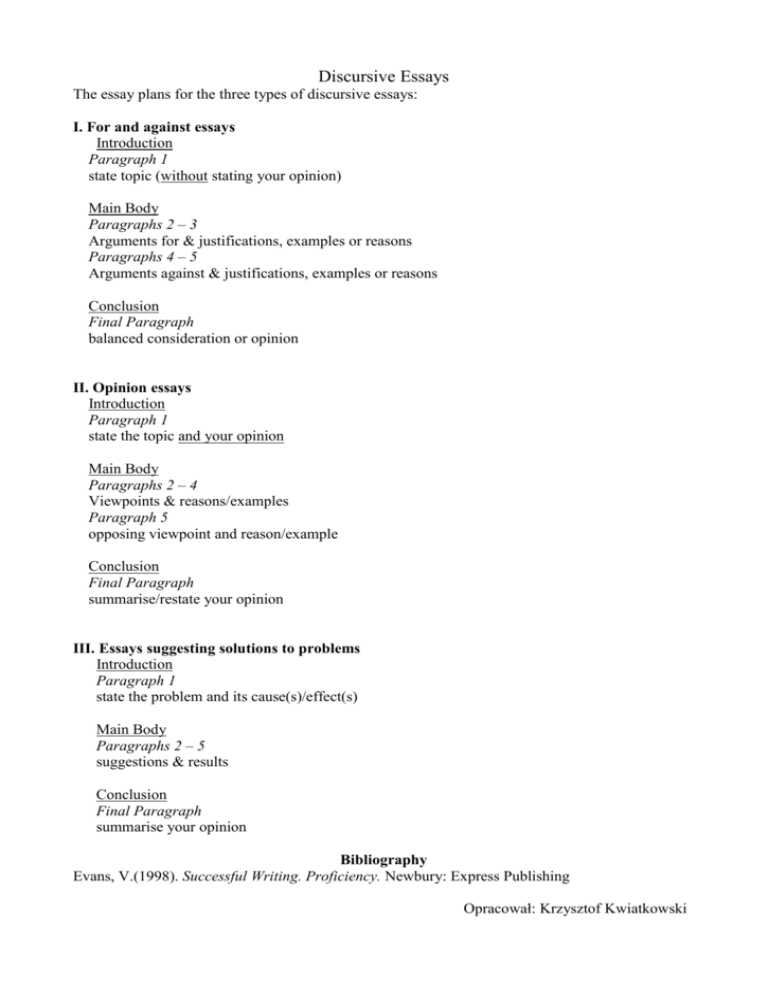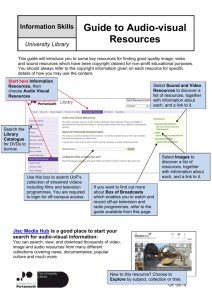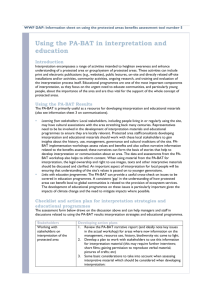Discursive Essays The essay plans for the three types of discursive
advertisement

Discursive Essays The essay plans for the three types of discursive essays: I. For and against essays Introduction Paragraph 1 state topic (without stating your opinion) Main Body Paragraphs 2 – 3 Arguments for & justifications, examples or reasons Paragraphs 4 – 5 Arguments against & justifications, examples or reasons Conclusion Final Paragraph balanced consideration or opinion II. Opinion essays Introduction Paragraph 1 state the topic and your opinion Main Body Paragraphs 2 – 4 Viewpoints & reasons/examples Paragraph 5 opposing viewpoint and reason/example Conclusion Final Paragraph summarise/restate your opinion III. Essays suggesting solutions to problems Introduction Paragraph 1 state the problem and its cause(s)/effect(s) Main Body Paragraphs 2 – 5 suggestions & results Conclusion Final Paragraph summarise your opinion Bibliography Evans, V.(1998). Successful Writing. Proficiency. Newbury: Express Publishing Opracował: Krzysztof Kwiatkowski I. For and against essays Euthanasia Does anybody have the right to decide about their life and death? This unanswered question can relate to the problem of euthanasia. As the dictionary says, “euthanasia is the act or practice of ending the life of an individual suffering from a terminal illness or an incurable condition, as by lethal injection or the suspension of extraordinary medical treatment” (The American Heritage Dictionary of the English Language, 1992). The issue of euthanasia raises a good deal of controversy. The supporters of euthanasia claim that it can cause more good than harm to patients and their families. The opponents of euthanasia believe that only God can decide about our life and death and there is always a ray of hope for recovery. Firstly, some people support the view that everyone has the right to decide about his or her life and death. For many terminally ill patients euthanasia is the only chance to relieve suffering and agony. When viewed from this perspective, euthanasia is not an act of killing but an act of mercy. Holland is the only country which legalized the practice of euthanasia. Thus, the new law allows Dutch doctors to help end the life of a person suffering unbearable pain from an incurable condition. In 1995 doctors in Holland received 9700 requests for euthanasia and in 3600 cases the requests were carried out (Wasilewski, 2001: 44). According to the data, it can be believed that euthanasia is needed and it is a good deed for terminally ill humans. In some countries in which euthanasia is forbidden there are incurably ill people who demand the right which would let them die with human dignity (Rybarczyk, 2001: 8). Secondly, the supporters of euthanasia insist that human life should not be sustained when someone lives in a permanent vegetative state and there is no hope for recovery because staying in hospital for a long time is a great cost for the whole family. Besides, a family may be torn emotionally if for several months their attention is focused on a dying member of the family. They do not go to work and neglect their duties. In such a case prolonging human life by doctors does not bring joy but adds sorrow and more pain. Moreover, the supporters of euthanasia think that the money spent on sustaining lives should be spent on those patients who have more chances for recovery. There is also another side to the issue of euthanasia. The opponents claim that an act of euthanasia is a crime in the light of the law but first of all in the face of religion and ethics. No man has the right to kill because it is not consistent with humane rules. Legalization of euthanasia would sanction murders and suicides. Also, it would be against the Bible and the Decalogue. Most people, especially religious ones, believe that only God can give life and can take it. And if physicians decide on the termination of human life, they act the role of God. Furthermore, it is generally suggested that there is always a ray of hope for recovery. It often occurs that the patient’s health state improves unexpectedly. In addition, although modern medicine is progressing, it does not have complete knowledge about all illnesses and ailments. That is why, in some cases a decision made by doctors about discontinuing a patient’s life may be wrong. It is often argued that euthanasia should be given when there is unbearable suffering. But in the medical world, there is a large difference of opinion on what “unbearable” is (Graff, 2000: 35). A physician should remember that pain, fear and depression may be treated and doctors ought to try to find ways of curing a patient even if he or she asks for death (Wasilewski, 2001: 45). In conclusion, it is clear from the above arguments that both the supporters and the opponents are right. I am convinced that euthanasia offers a dignified death but it is also a great moral dilemma for doctors and patients’ family. I feel that euthanasia should not be legal because it is a kind of murder or suicide. It is against my moral values and I would be full of remorse. Bibliography The American Heritage. 1992 (3rd ed.) Dictionary of the English Language, Houghton Miffflin Co. Graff, J. 2000. A lawful way to die. Time December 11: 35. Rybarczyk, M. 2001. Wybieram śmierć. Gazeta Wyborcza September 1-2: 8. Wasilewski, P. 2001. Ostatni zastrzyk. Polityka 19: 44-45. Opracował: Krzysztof Kwiatkowski II. Opinion essays Only stricter laws can prevent accidents The most valuable thing we have is our life. No wonder that everyone cares for it as much as possible. Taking some statistics into consideration, it must be admitted that lots of men, women and children are injured and killed by cars every year. Accidents happen too often because drivers break traffic regulations. Therefore, I believe that only stricter laws and new principles of getting a driving licence can prevent road accidents. To begin with, stricter traffic laws have an impact on the decrease of accidents and on our safety. Drivers know that they must not neglect traffic regulations but they do it because they are always in a hurry. That is why motorists violate the right way and often exceed the speed limit. In addition, if somebody is driving according to traffic regulations, some of them are very rude hooting at the driver. Also, more police should patrol traffic and fines for breaking traffic regulations should be very high. Drivers ought to receive penal points and be made to pass more difficult driving tests. Besides, a motorist with the smallest amount of alcohol in the blood ought to have his driving licence taken for ever. Secondly, new principles of getting a driving licence will improve our safety. The age at which young people are allowed to drive any vehicle should be raised to at least eighteen. Young people who are sitting behind a steering wheel are very reckless and irresponsible. These unimaginative motorists drive very fast because they tend to model themselves on the characters of action films. Their bravado results in numerous accidents in which innocent people are injured or even killed. Also, young motorists coming back from discos with their girls want to show off and breaking traffic regulations cause fatalities. Besides, a new way of passing driving tests and very demanding examiners will also prevent road accidents. Nowadays, you must be really good at driving if you want to pass a driving test. In contrast, it must be admitted that even strict laws do not always guarantee safety and fewer accidents on roads. Some of the traffic regulations are unconsidered and do not turn out to be useful, for example, driving in Warsaw with a maximum speed of fifty kilometers per hour. Moreover, it is known that roads in Poland are badly marked with signs. And although the number of cars increases, there is a lack of motorways and good road facilities. Motorists complain about pedestrians and cyclists because they are often guilty of accidents. Also, roads and pavements are not properly cleared of snow and can sometimes be very slippery in winter. To sum up, I am convinced that stricter laws prevent numerous road accidents. Motorists ought to be aware of severe fines and punishments. Their cars should be put through stringent annual tests for safety. Also, a bill which does not let import old second-hand cars from the West will improve our safety. If we want the accident problem to be solved, the government ought to spend more money on providing better road facilities. Opracował: Krzysztof Kwiatkowski The ever increasing use of technology has greatly improved our lives Since the 19th century, our lives have been improved by the advance of technological knowledge. The role which technology plays in our everyday existence is increasingly important. The last century, full of unprecedented technical and scientific achievements, had a great impact on the shape of our lives. The development of technology resulted in the appearance of new inventions such as computers, the Internet, mobile phones and satellite television, which make our lives easier and more comfortable. In my opinion technology has improved our lives because it has an influence on the comfort and happiness of mankind and is essential in modern communication and medical science. To begin with, one of the greatest technological inventions of the 20th century is certainly the computer. These invaluable machines have already revolutionized the way we live and work. So essential are they in our lives that one of the major requirements when applying for a job is the ability to operate some basic computer programmes. The banking and finance systems, telecommunication, accountancy, power stations and space research – all these spheres of life have been revolutionized by modern technology. Moreover, planes, computers and mobile phones have made the world a global village. The international network of computers enables us to send information to the other hemisphere in a few seconds. In fact the Internet, which is the fastest and the most popular way of communication, has unlimited possibilities. Not only is it a source of information but it also allows us to obtain the latest news on each topic of our lives (Lynch, 1997: 30). Furthermore, the Net can be used for shopping, study or business. Not surprisingly, schools and universities give an opportunity to participate in courses and lectures through the Internet, and businessmen use the Net to obtain the latest data from the Stock Exchange. Besides, our lives have been improved by the use of biotechnology. Not only are bacteria used in the food industry or to make chemicals and drugs but they are indispensable in sewage treatment plants as well (Bogen, 1979: 173). Secondly, technology has a great impact on the advance of medical knowledge. It has resulted in prolonging average life expectancy, which has risen dramatically over the last hundred years. Apart from the humble penicillin which has saved a great number of lives, medical science and technology allow us to carry out most complicated medical operations such as heart, kidney or liver transplants (Szawarski, 2001: 72). A laser beam, for example, is widely used in surgery, particularly to treat cancer. In addition, thanks to new technology surgeons are able to implant artificial parts of the body such as hearts, knee-joints or limbs (Nałęcz, Torbicz, 1987: 21). Furthermore, the Internet plays a considerable role in medicine in so-called tele-surgery; accordingly, surgeons are able to perform operations on patients by remote control and doctors from various countries can observe the operations and even participate in them. Moreover, the ability to clone mammals from cells that are not embryonic gives vast possibilities, from propagating endangered animal species to producing replacement organs for transplant patients (Nash, 1997: 39). Also, modern technology allows scientists to research human DNA and genes responsible for diseases (Pratzer, 1996: 29). In contrast, the use of technology also has disadvantages. As the possibilities of computers are almost infinite, their users spend too much time playing computer games or surfing the Internet, which results in wasting their free time and neglecting their duties. What is more, the Net is sometimes used for inappropriate purposes as some reckless and unreasonable people exhibit pornographic pictures and vulgar texts on it. Besides, there is always a possibility of stealing important data stored on computers in hospitals, banks or companies when a computer is networked; consequently, the stolen data may be used by insurance companies, bank agents or competing firms (Sareło, 2001: 174). Apart from this, as new technology has a wide application in genetic engineering, there are fears that it may lead to the creation of harmful viruses that cannot be controlled (Cooke, 1983: 245). Anthrax or other deadly bacteria can be used by terrorists or sects to produce biological weapons and kill thousands of innocent people (Cole, 1997: 46). Taking all points into consideration, I am convinced that the use of technology has greatly improved our lives. Modern technology has transformed the world into a global village and has made global communication fast and inexpensive; thus, the computer and the Internet are an absolute necessity in our everyday existence. Medical science enables us to implant artificial parts of the body, transplant human organs and clone cells. However, genetic engineering may lead to such harmful effects that cannot be predicted now. Unfortunately, the same inventions which save human life and improve the world can also be used to produce dangerous weapons which may threaten our planet. REFERENCES Bogen, H. J. (1979). Biotechnika. Osiągnięcia i perspektywy. Warszawa: Wiedza Powszechna. [Trans. Wanda Byczkowska-Smyk] Cole, L. A. (1997, February). “Widmo zagrożenia bronią biologiczną”. Świat Nauki, 46-52. [Trans.Paweł Struciński] Cooke, R. (1983). Wyzwanie naturze. Warszawa: Państwowy Instytut Wydawniczy. [Trans. Barbara Komuda] Lynch, C. (1997, May). “Przeszukując Internet”. Świat Nauki, 30-34. [Trans. Jarosław Zieliński] Nałęcz, M. & Torbicz, W. (1987). Rozwój biocybernetyki i inżynierii biomedycznej w kraju. In M. Nałęcz (Ed.), Postępy biocybernetyki i inżynierii biomedycznej. Komputery w medycynie (pp. 11-40). Wrocław: Zakład Narodowy im. Ossolińskich. Nash, M. (1997, March). “The age of cloning”. Time, 38-41. Pratzer, B. (1996, March). “Krajobraz z genem w tle”. Wiedza i Życie, 28-32. Sareło, Z. (2001). Media w służbie osoby. Toruń: Wydawnictwo Adam Marszałek. Szawarski, Z. (2001, March). “Moralność a medycyna”. Polityka, 9: 72-73. Opracował: Krzysztof Kwiatkowski III. Essays suggesting solutions to problems Children and television Television plays an important role in our lifestyle and has a huge impact on children. Unfortunately, there are only few good TV programmes for children and they are usually broadcast when children are at school. That is why they watch programmes meant for adults. The reasons for this situation are commercialization of public TV, the lack of money for new good programmes for children, and buying by TVs cheap programmes and cartoons showing violence to children. The consequence of this situation might be aggression among children and negative emotions. One possible way to solve this problem would be making television less commercialized. It is true that TV stations strive for viewers but it seems that they neglect the youngest ones. The TV greediness for money results in trashy commercials, hopeless reality shows and worthless soap operas. If television were not so commercialized and started to treat its mission seriously, there would be more worthy programmes for children such as Ciuchcia (Choo choo train) and 5-10-15 for example. Also, if children could see their favourite programmes on TV, and if the programmes were broadcast in due time, they would not watch films and programmes aimed at adults. I agree with Joanna Olech when she says that commercialization on television is now in fashion and good programmes for children are not broadcast (Olech, 2001:8). Another way to deal with this problem would be increasing television licence fees. Producers say that TV has too little money to create good programmes for children or to continue making new episodes of the programmes which have already appeared on TV, so this solution would improve the budget of public television. Diminishing budgets of programmes for children cause that producers decide to make low-budget programmes which are much worse and, in addition, produced by amateurs instead of specialists. If all viewers paid higher TV licence fees, the money would let producers employ experts and, of course, make good programmes which would be popular with the youngest audience and have high viewing figures. As a consequence, a nine-yearold pupil would watch his favourite programme after coming back home from school. Steps should also be taken to overcome the problem of buying by TV worthless programmes and cartoons which show violence to children. Unfortunately, TV does not offer the youngest audience much choice of good programmes or instructive cartoons. Children watch Pokemons because they are widely advertised and, in addition, they do not have alternative good cartoons to choose. This problem would be solved if some special bills were passed. The bills would order TV stations to broadcast cartoons which do not show aggression such as Przygody Bolka i Lolka (Adventures of Bolek and Lolek) and good programmes for children such as Mama i ja (Mummy and me), Do góry nogami (Upside down) and Tęczowe nutki (Rainbow-hued notes) for example. Moreover, these bills would specify how many hours on TV would be devoted to education and to teach sensitiveness and compassion. One final solution, which would help enormously, is enable parents, teachers and children to have an influence on types of programmes and quality of cartoons shown on TV. Parents pay TV licence fees and they should have a right to decide which programmes and cartoons can be broadcast and at what time of day. Because of a TV offer for children, which is not interesting, they watch programmes for adults. As statistics show 16.4 per cent of viewers who watch Big Brother reality show are children between four and fifteen years-old (ibid.). If parents with teachers and children put pressure on the management of Polish television, more good programmes for the youngest audience will be broadcast instead of reality shows and soap operas. Then parents and educators will not have to worry about the quality of the programmes, and children will be more interested in them and more satisfied. To conclude, I think that television should be more aware of its role and remember that it has a very important influence on child’s personality. Therefore, TV should not be commercialized and we should have an impact on a choice of programmes broadcast. And if public television does not have enough money to create new good programmes for children, TV licence fees should be increased. I believe that if these suggestions are realized, our children will have more good programmes to watch. Bibliography Olech, J. (2001). Twierdza Mugoli [The fortress of the Muggles]. Gazeta Wyborcza. 15-16 June: 8 Opracował: Krzysztof Kwiatkowski







